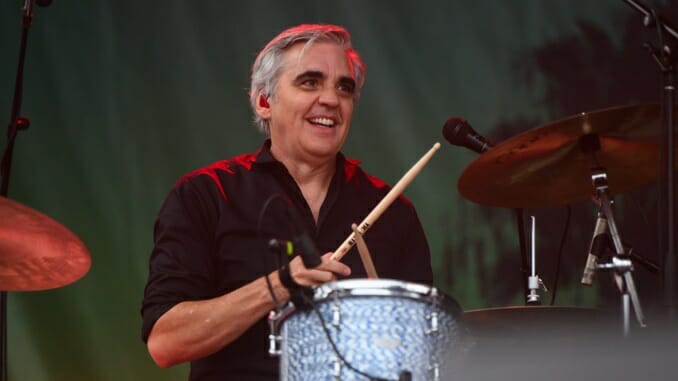Drumming in Spoon Still Feels Alright to Jim Eno
The Texas indie-rock institution’s founding drummer talks Spoon’s phases, using studio wizardry to Frankenstein a monster Smog cover, and why the band went back to basics for Lucifer on the Sofa
Photo by Scott Dudelson/Getty
If the world’s leading scientists conducted a study where they attempted to break down Spoon’s sound into its most essential elements, what would be left in the centrifuge?
My personal hypothesis consists of two things: The eternally cool songwriting style of frontman Britt Daniel, and the drum sound of Jim Eno, Spoon’s secret weapon.
Science talk aside, rhythm is such a key element of what makes Spoon songs tick, and Eno has always been the benevolent king of that particular court.
Benevolent, because he’s not firing off solos, needlessly changing the tempo or doing anything to make it about him—while Eno has a booming presence, his parts are always precision-tuned to helping the rest of the band groove, rip, or veer in the unexpected directions that Spoon songs sometimes take.
But when Eno does step into the spotlight, when you notice him for the first time, you realize that it’s hard to imagine what Spoon would sound like without him behind the kit. The cracking thunder in the back half of “The Way We Get By,” that teeth-rattling intro to “Rent I Pay,” that immortal beat in “I Turn My Camera On”—all prime examples of that special sauce Eno adds to the Spoon formula.
When I spoke to Eno, he was a week out from flying to Mexico for Spoon’s co-headlining performance at Wilco’s Sky Blue Sky. With the band’s 10th album, Lucifer on the Sofa, then only a month away from release, I asked him to reflect a bit on the band’s incredible journey thus far.
“It’s hard to put it all in words. I mean, I definitely didn’t think we would put 10 records out and be together for this long,” he said. “The idea that I’m able to do music for a living is always insanely rewarding and humbling.”
If you aren’t familiar with the way Spoon almost instantly failed, then came back from the brink to build one of the most celebrated discographies in indie rock, allow me to offer the CliffsNotes version of their near-30-year career.
Phase 1 started around 1994, when Daniel and Eno formed Spoon in Austin after the previous band the two were in, The Alien Beats, split. Initially, their future seemed bright—after releasing their first album on Matador, they signed a major label deal with Elektra and released their second album, A Series of Sneaks, in 1998.
Things quickly soured. Sneaks didn’t sell well, and just a few short months after it was released, Spoon were abandoned by their A&R rep and dropped from Elektra within the same week. They nearly called it quits.
Despite that rough start, Spoon reemerged in 2001 with Girls Can Tell on Merge Records, which essentially rebooted their career and ushered in an incredibly lucrative and creative Phase 2. Over the rest of that decade, Spoon released five great albums and watched as their fanbase and stature in indie gradually grew, eventually performing on SNL, and cracking the top 10 of the Billboard 200 in 2007 with Ga Ga Ga Ga Ga and in 2010 with Transference.
-

-

-

-

-

-

-

-

-

-

-

-

-

-

-

-

-

-

-

-

-

-

-

-

-

-

-

-

-

-

-

-

-

-

-

-

-

-

-

-








































